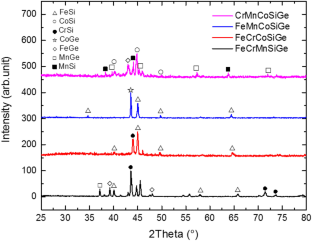Exploring the Magnetic Behavior of a Magnetic High-Entropy Alloy with Dual-Phase B20 Crystal Structure
Abstract
The rapid advancement of big data, artificial intelligence, and cloud computing technologies has led to a significant increase in demand for high-density magnetic storage. High-entropy alloys offer better control over the properties of magnetic storage materials, allowing for a wider range of magnetic configurations. In this study, a five-membered magnetic alloy was created using powder metallurgy. It was revealed that both FeCrCoSiGe and FeMnCoSiGe alloys are dual-phase high-entropy alloys consisting of B20 CoGe- and FeSi-based phases. The study also demonstrated an interesting “kink” feature observed in the temperature-dependent magnetization of FeCrMnSiGe that suggests a potential association with helimagnetism. The helimagnetism is from the intrinsic helical ferromagnetism in the CoGe matrix phase and varies with the magnetic interactions due to the doped atoms. Furthermore, the temperature-dependent magnetization showed that replacing chromium (Cr) with cobalt (Co) could potentially reduce the magnetization transition to approximately 60 K. A complete substitution of chromium with manganese (Mn) could also alter the magnetic transition behavior. FeCrMnSiGe, FeCrCoSiGe, and FeMnCoSiGe were identified as soft magnets based on their field-dependent magnetization. The magnetic properties could be adjusted by modifying the composition and lattice distortion of the alloy. This study has the potential to aid in the development of a new material system with an adjustable chiral magnetic structure for spintronic memory devices.


 求助内容:
求助内容: 应助结果提醒方式:
应助结果提醒方式:


